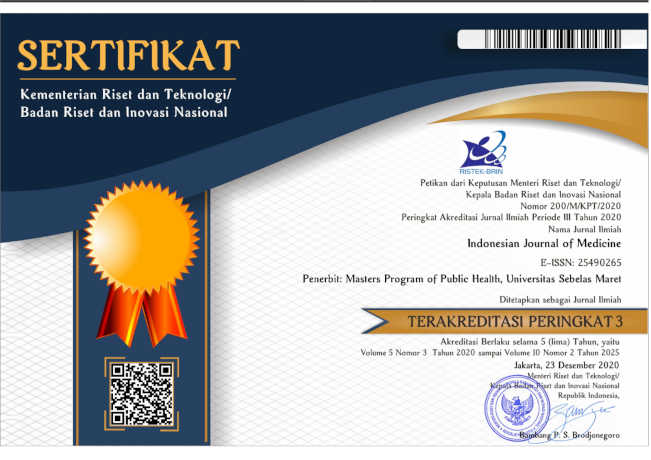Effect of Captopril Rapid Uptitration to Plasma Aldosterone level in Patients with Acute Myocardial Infarction
DOI:
https://doi.org/10.26911/theijmed.2016.1.3.26Abstract
Background: Acute myocardial infarction is a myocardial necrosis associated with acute myocardial ischemia of which the incidence keeps increasing over time. Appropriate management of acute myocardial infarction is very important in order to determine the efficacy of the therapy and also to prevent further complications due to acute myocardial infarction. Captopril is essential in the management of acute myocardial infarction to inhibit the renin-angiotensin-aldosterone system whereby aldosterone may increase the probability of heart failure and increase mortality up to approximately 10 times compared to patients with acute myocardial infarction without heart failure. The administration of captopril should be uptitrated the doses in order to obtain optimal results, however there is no such fixed standard on how fast the doses of captopril should be uptitrated in order to obtain a more optimal effect, especially in order to suppress the plasma aldosterone level. This study examined the effect of rapid uptitration of captopril in the first 3 days of treatment of patients with acute myocardial infarction on plasma aldosterone levels compared to the increase in the captopril standard uptitration.
Subjects and Method: This is an experimental research with Randomized Controlled Trial (RCT). 28 patients with Acute Myocardial Infarction on Cardiovascular Intensive Care Unit (ICVCU) and Cardiovascular wards of RSUD Dr. Moewardi hospital Surakarta were sequentially involved as research subjects and then randomly divided into a control group who received standard captopril uptitration and treatment group who received captopril rapid uptitration. The blood plasma was taken on the first day before the administration of captopril and on the last day of treatment. The plasma aldosterone level was tested by ELISA. Independent t-tests were carried out for data that qualified the normality test and mann whitney test if not qualified in the normality test with kolmogorov smirnov. It was considered statistically significant if the value of p < 0.05.
Results: Plasma Aldosterone levels in treatment group was lower than control group and statistically significant (1133.54 ± 748.81 pg/dl vs 512.16 ± 444.81 pg/dl; p = 0.013 )
Conclusion: Treatment with captopril rapid uptitration can decrease aldosterone plasma levels lower than captopril with standard uptitration in patient with acute myocardial infarction.
Keywords: Acute myocardial infarction, plasma aldosterone, captopril, captopril rapid uptitation.
Correspondence: Verry Gunawan Sohan. Master Program of Family Medicine, Sebelas Maret University, Surakarta.
Indonesian Journal of Medicine (2016), 1(3): 160-168
https://doi.org/10.26911/theijmed.2016.01.03.03
References
Beygui F, Collet JP, Benoliel JJ (2006). High plasma aldosterone levels on admission are associated with death in patients presenting with acute ST elevation myocardial infarction. Circulation. 114: 2604-2610.
Brown NJ, Vaughan DE (1998). Angiotensin converting enzyme inhibitors. Circulation. 97: 1411-20.
Bussmann WD, Micke G, Hildenbrand R, Klepzig H, Jr (1995). Captopril in acute myocardial infarction: beneficial effects on infarct size and arrhythmias. Clinical cardiology. 18: 465-70.
Hamm CW, Bassand JP, Agewall S (2012). [ESC guidelines for the management of acute coronary syndromes in patients presenting without persistent ST segment elevation. The Task Force for the management of acute coronary syndromes (ACS) in patients presenting without persistent ST segment elevation of the European Society of Cardiology (ESC)]. G Ital Cardiol (Rome). 13: 171-228.
Hurwitz S, Cohen RJ, Williams GH (2004). Diurnal variation of aldosterone and plasma renin activity: timing relation to melatonin and cortisol and consistency after prolonged bed rest. Journal of applied physiology. 96: 1406-14.
Ivanes F, Susen S, Mouquet F (2012). Aldosterone, mortality, and acute ischaemic events in coronary artery disease patients outside the setting of acute myocardial infarction or heart failure. European heart journal. 33: 191-202.
Juilliere Y, Cambou JP, Bataille V (2012). Heart failure in acute myocardial infarction: a comparison between patients with or without heart failure criteria from the FASTMI registry. Revista espanola de cardiologia. 65: 326-33.
Kementerian Kesehatan RI (2013). Riset Kesehatan Dasar. Jakarta: Kementerian Kesehatan RI.
Mahajan VS, Jarolim P (2011) How to interpret elevated cardiac troponin levels. Circulation. 124: 2350-2354.
Makam AN, Nguyen OK (2015). Use of cardiac biomarker testing in the emergency department. JAMA internal medicine. 175: 67-75.
Mignano A, Pitruzzella V, Arnone G (2014). Prognostic role of aldosterone in patients with acute coronary syndrome: short and medium term follow up. Journal of cardiovascular medicine. 15: 27-32.
O'Gara PT, Kushner FG, Ascheim DD (2013). ACCF/AHA guideline for the management of ST elevation myocardial infarction: executive summary: a report of the American College of Cardiology Foundation/American Heart Association Task Force on Practice Guidelines. Circulation. 127: 529-55.
Pacher R, Globits S, Bergler Klein J (1993). Clinical and neurohumoral response of patients with severe congestive heart failure treated with two different captopril dosages. European heart journal. 14: 273-8.
Pitt B (2012). Plasma aldosterone levels in patients with coronary artery disease without heart failure or myocardial infarction: implications for pathophsiology, prognosis, and therapy. European heart journal. 33: 162-4.
Ray SG, Pye M, Oldroyd KG (1993). Early treatment with captopril after acute myocardial infarction. British heart journal. 69: 215-22.
Siswanto BB, Hersunarti N, Erwinanto (2015). Pedoman Tatalaksana Gagal Jantung. Tatalaksana Farmakologis. 1 ed. Jakarta: PERKI.
Thygesen K, Alpert JS, Jaffe AS (2012) Third universal definition of myocardial infarction. 126: 2020.
Udell JA, Morrow DA, Braunwald E (2013). Inhibition of the reninangiotensin system reduces the rise in serum aldosterone in acute coronary syndrome patients with preserved left ventricular function: observations from the AVANT GARDETIMI 43 trial. Clinical chemistry. 59: 959-967.
White PC (2003). Aldosterone: direct effects on and production by the heart. The Journal of clinical endocrinology and metabolism. 88: 2376-83.











